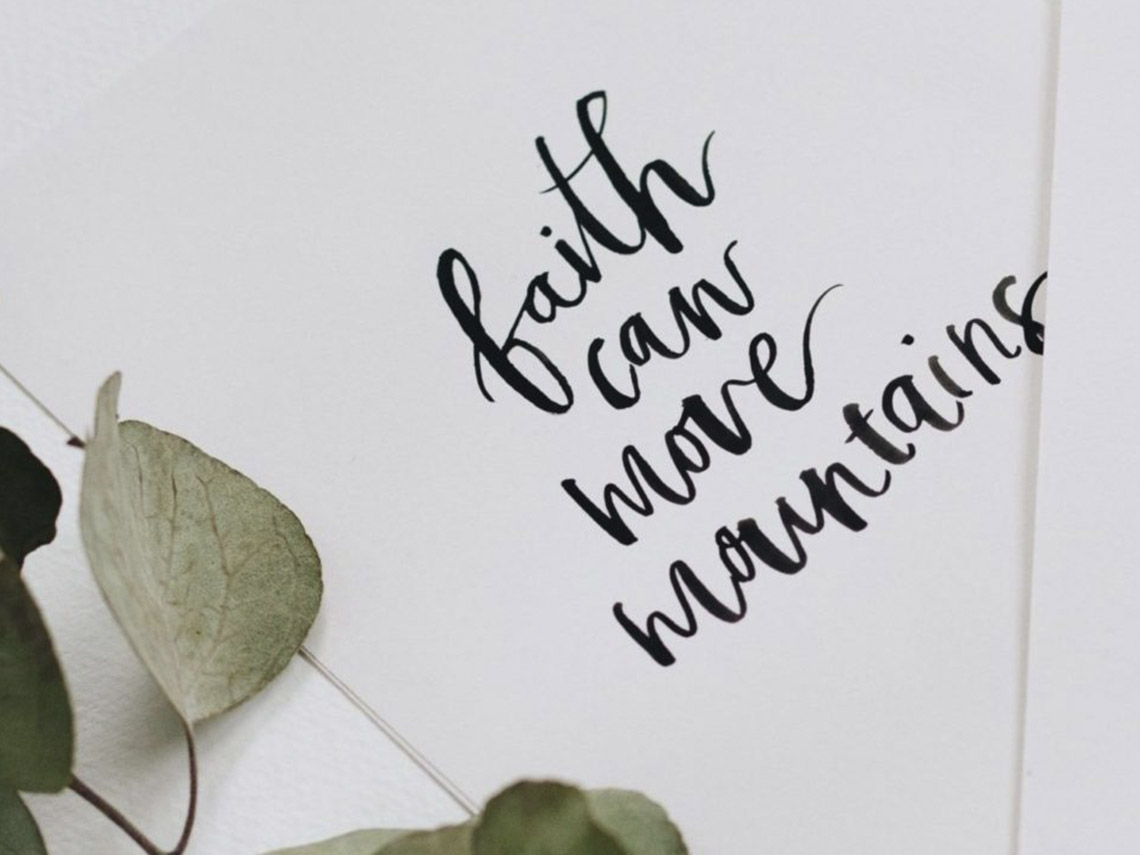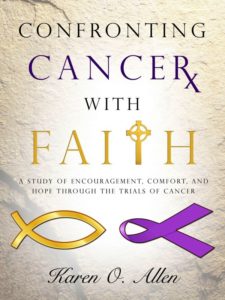
BUILDING YOUR FAITH
You know the old cliché: Be careful what you pray for because you might just get it! We all have testimonies to validate the truth of that, don’t we? One thing we fail to recognize, however, is that we only get what we ask for when it falls within the Lord’s will.
It had been only a few months before my cancer diagnosis when I prayed to increase my measure of faith. I wanted a deeper faith that reached beyond my inward self to expand outward towards others in a more noticeable way. I asked God to teach me how to have that kind of faith. Little did I know it would come under the disguise of cancer!

Faith is A Response
We cannot always choose what will happen to us but we can choose how we will respond. The truth is nobody makes me react the way I do. Thankfully I chose to respond to my cancer in a way that would build my faith in the process. Beth Moore, Christian author/speaker, put it in plain, simple terms: “Faith is a response; not an action. If we strive to have faith, we may be miserably disappointed. But if we learn to trust in His faithfulness, we will be greatly blessed.â€1
Let me emphasize – I didn’t wrestle with keeping my faith; I wanted to build my faith. “God expects more than just perseverance in our faith; we need to build it,†said my Sunday School teacher. I felt confident in the assurance that my faith would keep me, that is, sustain me, but I longed for more than sustenance. Of course, I wanted the lingering effects the sustenance my faith offered much like the sustain pedal on a piano allows for notes to still be heard after they’ve been played. But what I desired was the building of chords with perfect harmony leading towards a crescendo erupting in sweet melody.
The degree of our faithfulness is directly related to our belief in God’s believability.2 We need not become self-absorbed in quantifying the amount of faith we have although even the disciples asked Jesus to increase their faith (Luke 17:5). The Bible says a mustard seed’s measure of faith can go a long way but let’s take it a step further. In Charles Stanley’s book God Is In Control, he says, “God isn’t satisfied with a little faith or even great faith; He wants perfect faith.†What, then, is perfect faith?
Little Faith says, ‘Oh, I know He can. Will He? I know He can.’
Great Faith says, ‘I know He can and Hallelujah, I know He will.’
Perfect Faith says, ‘It’s as good as done. God made the promise.’3
The Side-effects of Faith
Throughout life, regardless of the circumstances, I have learned that you must place your focus upon God – not your faith, not anointings, not physicians, not trying to determine what you have done to deserve this, but solely upon God. Cancer (or any crisis) absolutely cannot be the focus although that is what our human nature screams. “Set your mind on the things above, not on the things that are on earth†(Col 3:2). Hear that again. Your crisis (e.g. cancer) cannot be the focus. Allow it to be the vehicle that brings you to a place of perfect faith. It takes discipline but you will be rewarded not only spiritually but also physically and mentally. Throughout my cancer journey, there were times when I would lose the focus of my faith. Those were the times when I could literally feel the heaviness of my burdens bearing down upon me. My body felt heavier, my walk became slower, my thought processes dulled, and my energy drained. The plight of my circumstances caused me to falter when I focused upon them but when I would regain my focus to be upon God, the symptoms would quickly dissipate.
We may have little faith; we may have great faith but God isn’t interested in how much we have as He is in that what we have is perfect. In developing my own layman’s definition, I came to the understanding that perfect faith is the acceptance of waiting and allowing God to be God. Perfect faith is in no way passive. It is a blend of active patience and passionate pursuit while seeking God’s heart in the midst of simple surrender.
The Purpose and Practice of Faith
The purpose of faith is not to change our circumstances (as much as we may want it to) but rather to change us. Remember that faith is about our response to our Abba Father, which is a direct correlation to the relationship we have with Him, a relationship deepened by the intimacy we develop through a living fellowship.
Newsflash. Putting faith into practice does not always feel good – it’s kind of like wearing a new pair of shoes that have yet to be broken in. There are times when we have to fight to maintain our faith. One of Satan’s most effective weapons is fear. Destructive fear, as opposed to wise fear (the kind your mother taught you), is a product of the power of darkness. Satan will stop at nothing to create an atmosphere where fear abounds. Perhaps that is what Paul meant when he referred to “fighting the good fight†(II Tim 4:7). Be encouraged that just like the new shoes that don’t feel comfortable at first, the more we wear them, the more comfortable they become and in turn, the more we want to wear them. Hence, the more we put our faith into practice, the more it begins to take residence in our hearts.

Choose to build your faith through the hard times. I promise ewe will be blessed.
1 Beth Moore, Living Beyond Yourself, lesson on Faithfulness
2 Ibid.
3 Charles Stanley, God Is In Control book
This blog is modified from a lesson in my book “Confronting Cancer with Faith.â€

2 Comments
Leave a Comment
Follow This Blog
Ewe R Blessed Ministries / Karen O. Allen

Ms. Karen,
What an amazing and eye-opening post ma’am. I love the thought of “Faith is a response, not an action.” Thank you for sharing this inspiring message ma’am.
Thank you, J.D. It’s not always easy to respond in faith but it makes the trial more bearable.